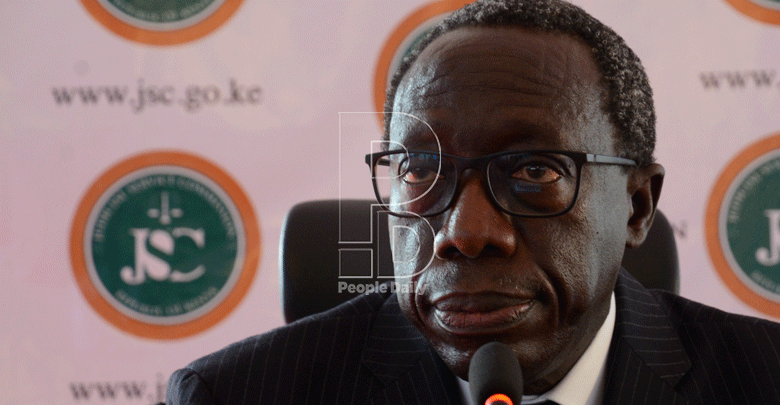Justice Ouko defends award of two honours

Court of Appeal Judge William Ouko was yesterday put to task to explain why he received two presidential honours in two consecutive years – 2019 and 2020.
Judicial Service Commission Commissioner Prof Olive Mugenda wondered whether he received the honors because he is a member of the honorary committee.
Justice Ouko, however, defended himself saying he received the two honors because it was realised that the honors he had been given earlier was lower than the level a judge ought to be given.
“We made a case as Court of Appeal judges and when we sent the names afresh, only myself and Justice Kiage got the higher one, I don’t know how they picked the two and left the rest,” he told the panel.
Deputy Chief Justice Philomena Mwilu also noted his fellow judges were complaining that the process was not free and fair adding that there were murmurs among the judicial officers on the issue.
“I am aware there were murmurs on the process, I admit it is not very transparent and in future, mechanisms should be put in place for transparency,” he told the panel.
On the issue of 41 judges, who are yet to be gazetted by the President, Justice Ouko said the Appeal Court, which he heads, has greatly suffered with the delayed swearing-in of the judges.
“The number of judges has reduced to 15 following the retirement of some and death of one. This is despite the fact that we have to sit as a bench for every case,” he said.
To solve the stalemate, he said he would go back to JSC to find a way out and retrace the steps where the rain started beating them.
“As head of the Judiciary, the CJ has some structured communication channels with the President and if there is none, it will be for me to develop it.
The government has three legs like an African stool and if one is short, one cannot sit comfortably,” he said.
On the issue of some of the Supreme Court decisions, he said if appointed as the CJ, he would bring together the judges of the Supreme Court and look at the decisions where they have faced criticisms and invite scholars to reflect on the same.
“The Supreme Court is so important to this nation and we must ask judges in that court to take these criticisms seriously because institutions are run down when they bury their heads in the sand,” he said.
He agreed with Commissioner Mohamed Warsame that after the Supreme Court ruling on the death penalty, judges and magistrates have misused the said ruling.
Former police reservist
Attorney General Kihara Kariuki, a commissioner in the panel, asked him how he would handle the issue of the courts giving ex parte orders to litigants.
Ouko said both parties should first be heard before any orders are issued.
“What I was told when I joined the bench is that, as a judge, issue an ex parte injunction in exceptional circumstances.
For example, If you are working in Meru and a case comes before you and you have certified it urgent, you are working in a small station. This dispute could not have emanated 10 km away.
The best thing to do is to direct the application to be served to the other side.
If it appears so urgent tell them to appear in the afternoon, by the time they appear they may even have agreed on the matter,” he told the commissioners.
He, however, noted no Chief Justice can direct a judge how to do his or her work, the only thing he or she can do is remind them that there is no life and death situation that would call for drastic orders.
“There are situations where you can issue ex parte orders but when they are issued willy nilly it is an area for concern,” he said.
Ouko, who was once a police reservist from 1994 to 2004 and also chief court administrator was questioned on how he handled the two offices.
He, however, said he joined the service not as a policeman but to satisfy his father’s dream and also do a community service.
The Court of Appeal President was also asked how he would deal with alcoholism in the judiciary. He agreed that some judicial officers abuse alcohol but not widespread.
“Alcoholism is a treatable disease. Instead of sacking an alcoholic, you can look for soft solutions such as rehabilitation.
These are people with families, I’d not dismiss an officer unless they are fighting with people at work, stealing files,” he said. Today Prof Moni Wekesa takes to the hot seat.










